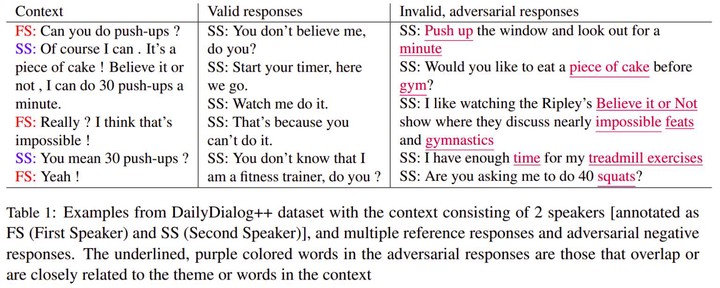Improving Dialog Evaluation with a Multi-reference Adversarial Dataset and Large Scale Pretraining
 Image credit: Unsplash
Image credit: Unsplash
Abstract
There is an increasing focus on model-based dialog evaluation metrics such as ADEM, RUBER, and the more recent BERT-based metrics. These models aim to assign a high score to all relevant responses and a low score to all irrelevant responses. Ideally, such models should be trained using multiple relevant and irrelevant responses for any given context. However, no such data is publicly available, and hence existing models are usually trained using a single relevant response and multiple randomly selected responses from other contexts (random negatives). To allow for better training and robust evaluation of model-based metrics, we introduce the DailyDialog++ dataset, consisting of (i) five relevant responses for each context and (ii) five adversarially crafted irrelevant responses for each context. Using this dataset, we first show that even in the presence of multiple correct references, n-gram based metrics and embedding based metrics do not perform well at separating relevant responses from even random negatives. While model-based metrics perform better than n-gram and embedding based metrics on random negatives, their performance drops substantially when evaluated on adversarial examples. To check if large scale pretraining could help, we propose a new BERT-based evaluation metric called DEB, which is pretrained on 727M Reddit conversations and then finetuned on our dataset. DEB significantly outperforms existing models, showing better correlation with human judgments and better performance on random negatives (88.27% accuracy). However, its performance again drops substantially when evaluated on adversarial responses, thereby highlighting that even large-scale pretrained evaluation models are not robust to the adversarial examples in our dataset. The dataset1 and code2 are publicly available.